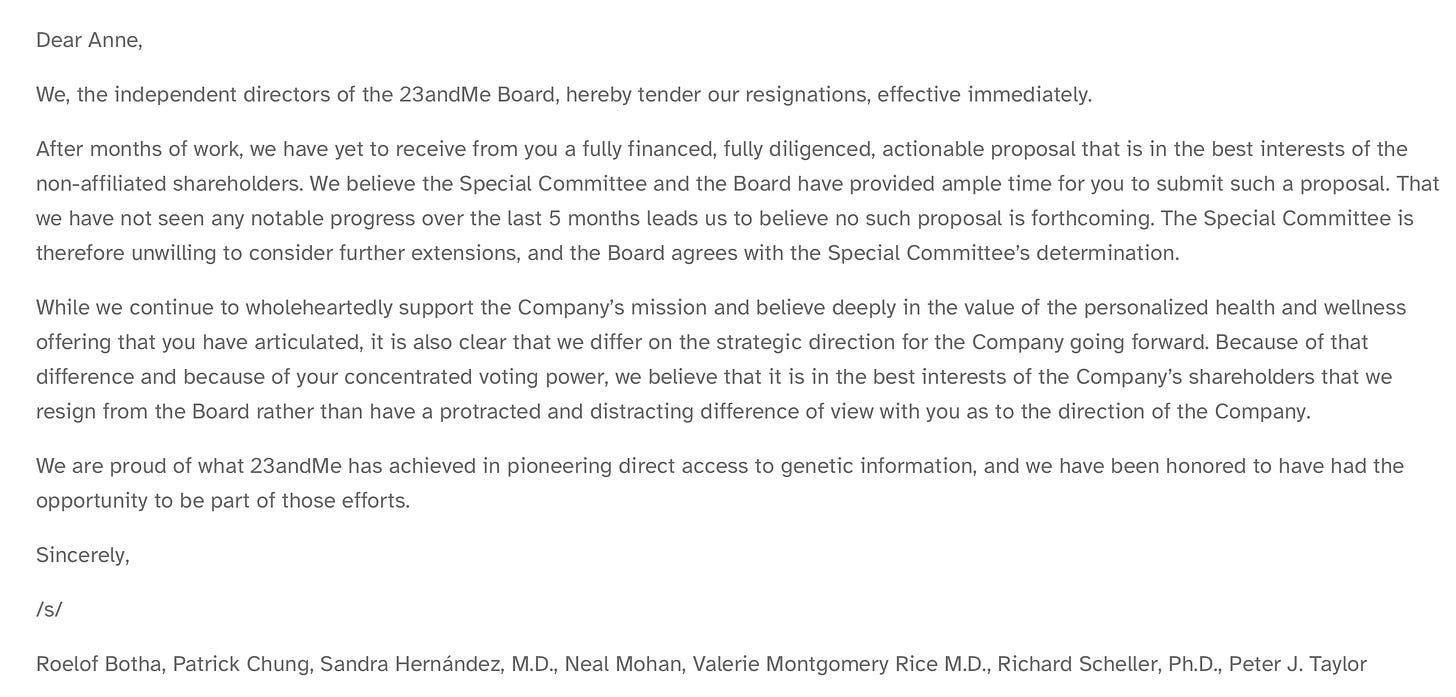What should happen to 23andMe?
Seeking wisdom from the crowd... plus a tutorial on how to delete your data
I was at a dinner this week with some of the brightest minds in healthcare data and genomics. Shortly after introductions, I posed a provocative question to the table: “What should happen to 23andMe?”
We spent the next three hours hashing it out – debating the minutiae of patient consent, whether 23andMe could pose biosecurity risks if it landed in the wrong hands, the importance of buying disability insurance before undergoing genetic testing, and ultimately, imagining a not-to-distant world in which all health data is truly liquid, and what that will mean for all of us.
For those who haven’t been following, 23andMe, the popular DNA testing company, is facing severe financial difficulties and potential collapse. The company's stock price has plummeted 99% from its peak, from a ~$6b market cap to $150m in October 2024.
In recent months, 23andMe has shut down its drug development unit and undergone multiple rounds of layoffs. Most dramatically, the entire board of directors resigned last month, leaving only CEO and co-founder, Anne Wojcicki, in charge.
These troubles stem from 23andMe's inability to create a sustainable business model beyond one-time DNA test purchases. With genetic data from ~15 million customers in its possession, the company's most valuable asset may now be this trove of sensitive personal information. Wojcicki had floated the possibility of selling the company, which raised serious privacy concerns about what could happen to customer DNA data under new ownership.
Adding to these worries, 23andMe suffered a major data breach in 2023 affecting nearly 7 million users. The company is also not bound by HIPAA health privacy laws that protect medical information. While 23andMe claims to take customer privacy seriously, its policies allow for changes in how data is used, especially in the event of a merger or acquisition.
For the millions who have used 23andMe's services, these developments are deeply concerning. The potential misuse or sale of genetic data could have far-reaching consequences for privacy and personal autonomy. As 23andMe's future remains uncertain, customers are left wondering what will become of their most personal information.
About a week ago, however, Wojcicki announced in a regulatory filing that she no longer plans to consider third-party takeover proposals, stating that her focus is now on taking the company private. This announcement marked a shift from her earlier willingness to entertain external offers while assessing her own proposal, and of course, is subject to change.
So, what should happen to 23andMe?
I’ll admit, we didn’t answer this question over dinner. That’s why I’m seeking the wisdom of the crowd. Inspired by Nikhil Krishnan’s former Get Real series, I want to hear your ideas on what should happen next. Privacy concerns? Research potential? Ethical considerations? Let's explore it all!
What should happen to 23andMe? Drop your best ideas in this form. I'll feature the most interesting perspectives as well as my own in my next post, giving credit if you want it. Share your thoughts by 10/15 to be included.Peace,
Morgan
P.S. Here's how to delete your 23andMe data:
1. Log into your 23andMe account and navigate to the "Account Settings" section.
2. Look for a subsection called "23andMe Data" within your account settings.
3. In this section, you should find an option to opt-out or delete your personal information.
4. Follow the prompts to request deletion of your data.
However, it's important to note some key limitations to this process:
1. 23andMe is legally required to retain some information. They will delete the majority of your personal information, but not all of it.
2. The company will retain your genetic information, date of birth, and sex to comply with legal obligations, even if you choose to delete your account.
3. Some information associated with your account, such as email addresses, will also be retained.
4. If you participated in 23andMe Research, your genetic data and self-reported information won't be used in future research projects, but previously used data cannot be removed from completed studies.
5. When you request account deletion, 23andMe says they will "immediately and automatically begin the deletion process."
6. If you asked 23andMe to store your genetic samples, they will be discarded upon account deletion.
While you can request deletion, some of your data will remain with the company due to legal requirements. If you have specific concerns, it may be worth contacting 23andMe's customer service for more detailed information about your particular situation.
Sources:
https://www.theatlantic.com/health/archive/2024/09/23andme-dna-data-privacy-sale/680057/
https://www.businessinsider.com/how-to-delete-your-23andme-data-2024-10
https://www.npr.org/2024/10/03/g-s1-25795/23andme-data-genetic-dna-privacy







My Heritage/Grail/Illumina should buy it!
A big question is how to truly “de-identify” such high resolution data. Throw in synthetic data? Maybe only sell SNP reports?
Otherwise the uniqueness will be forever potentially linked to a unique identity.